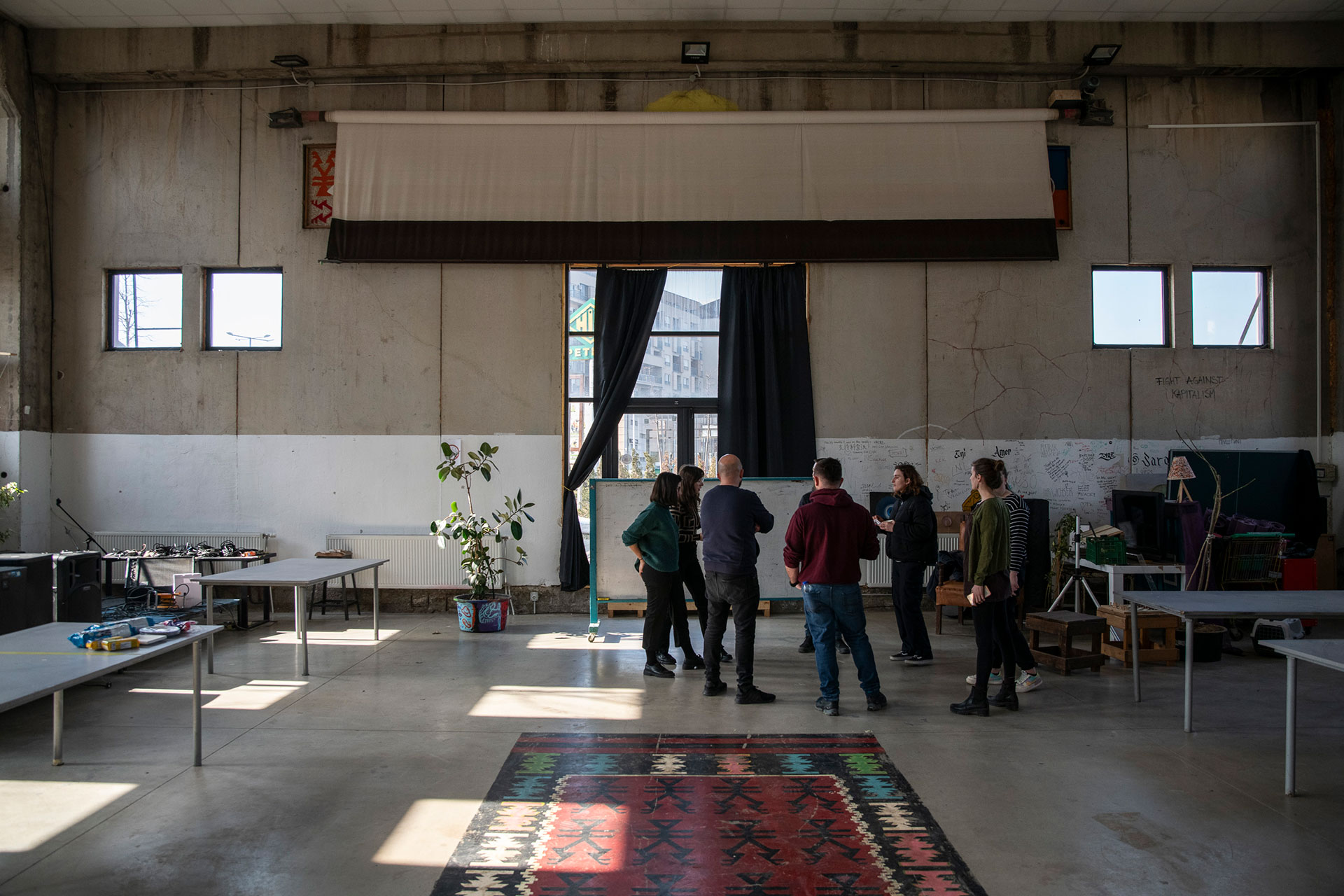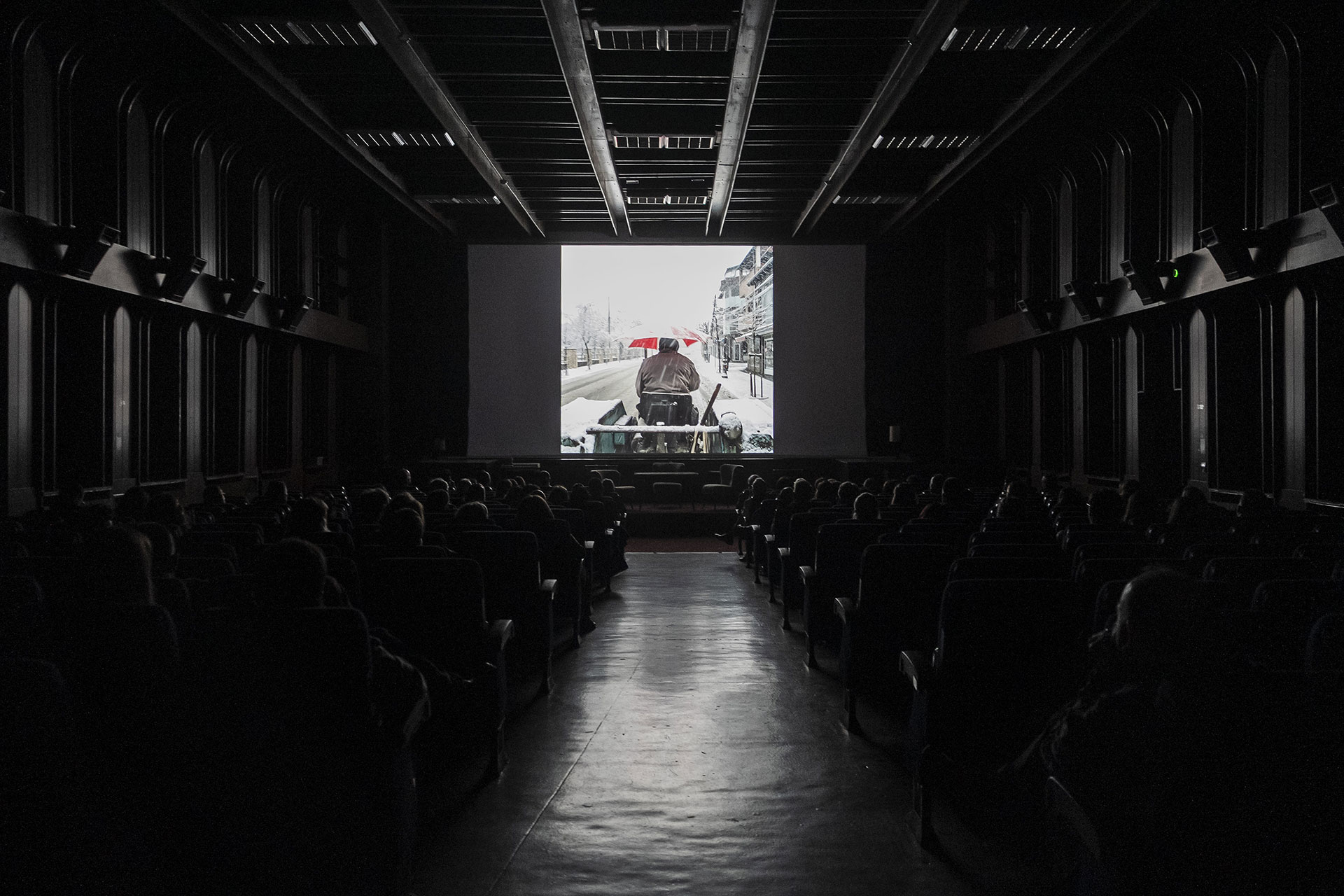Public properties are essential for the development of a city’s cultural and social life. In principle, they should be accessible and open to all, while their character is created, transformed, or extinguished depending on the needs of city residents. From social centers and cinemas to spaces for storytelling and artistic creativity, the transformation of public properties into areas accessible to the community is often seen as a measure of a city’s livability.
Public property in Prishtina, however, has rarely been treated as belonging to its citizens. In fact, the opposite has occurred: since the war, public properties have been appropriated by politics and businesses, and spaces that are meant to be accessible to the community have become alienated from collective memory. This situation is not accidental. It is, above all, a materialization of institutional politics, where, in the name of economic development, many public properties have been privatized and used for financial gain by those in power.
From the privatization of former socially owned enterprises — carried out in the name of “Kosovo’s reconstruction and economic development” and marked by suspicions of corruption, irregularities and violations of workers’ rights — to the usurpation of land, parks and buildings across the city, public goods have been treated by political power merely as opportunities for monetary profit.
The same logic continues to shape the current institutional management of public property. Laws and regulations designed to govern the use of municipal public property clearly favor businesses, making it extremely difficult for the community to access and use these properties.
Without proper legal recognition and consideration for the social and cultural value that such properties can offer — a value that should be a criterion when determining their use — municipalities monetize each property in an institutional neoliberal mindset, turning them into products awarded to the highest-capital bidder in order to generate as much financial benefit for the municipality as possible.
Procedures for putting public properties into use
The utilization of municipal properties is regulated by the Law on the Provision for Use and Exchange of Immovable Property of the Municipality. This law aims to facilitate the use of these properties for the purpose of sustainable economic development, increasing value, and fulfilling the general interest. The procedures are further defined by the Regulation on the Determination of Procedures for the Allocation and Exchange of Municipal Immovable Property.
In normative terms, legal conditions and procedures promote financial gain, overshadowing the social and cultural value of public properties, and making access difficult for civil society organizations (CSOs), especially when compared to businesses, which in most cases are the main beneficiaries.
Public property is treated as an economic asset, and the winner is simply whoever offers the highest price, regardless of the social value that property holds.
The law provides that immovable municipal properties may be granted for use to natural and legal persons registered in Kosovo, for periods ranging from less than one year, from one to 15 years for short-term use and up to 99 years for long-term use. When it comes to NGOs, however, the law imposes a limitation: municipalities may grant them properties only for short-term periods. This distinction has no legal justification, contradicts the principle of equal treatment of parties and does not reflect the reality of Kosovo, where many civil society organizations continue to operate for years after their establishment, demonstrating their social sustainability.
In practice, public properties may be granted for use through public auction, expression of interest, or negotiations between the mayor and interested parties. However, each of these procedures, in essence, prioritizes businesses. For example, in the case of a public auction, public property is treated as an economic asset, and the winner is simply whoever offers the highest price, regardless of the social value the property may hold for the community.
The law does not directly prohibit CSOs from participating in auctions, but the financial criteria make it almost impossible. Without institutional support or significant financial resources, these organizations cannot offer the “highest price” and, in practice, are excluded from the competition. Thus, the process of granting use remains based mainly on financial criteria, overlooking the social and community benefits that could be provided.
The other procedure, expressions of interest, in theory offers more possibilities. The municipality can accept proposals from individuals or organizations for the long-term use of public properties. But in practice, it is built on the same basic principle as the public auction — municipal properties are treated as instruments for economic benefit and for maximizing the municipality’s own revenues. Here too, evaluation is based mainly on criteria such as the value of the investment, the number of jobs, or economic sustainability, while social, cultural or community values remain outside the equation.
In this context, an organization proposing to open a cultural center, community library or cultural space does not have the same chances as a business promising to pay the highest rent or generate more income for the municipality.
Another procedure provided by the law is direct negotiation with the mayor, which can be used only when there has been no interest in a property through either a public auction or an expression of interest. In such cases, the mayor has discretion to decide on granting the property for use, based on the criteria established by law — which again prioritize projects according to minimum investment values or investment in certain sectors.
Negotiation of offers by the Mayor
According to the regulation on determining the procedures for granting use and exchanging immovable property of the municipality, the Mayor may exercise the right to negotiate in cases where the investment value is at least 10% of the municipality’s total capital investment budget from the previous year, but not more than the minimum value determined by the Law on Strategic Investments in the Republic of Kosovo.
In addition to these three procedures — auctions, expression of interest and negotiation — the law also provides a special opportunity for NGOs operating in the fields of education, culture or social services, and aim to contribute to these areas within the competencies of the municipality. But here too, the selection criteria remain unclear, as it’s determined by internal municipal acts — acts that have not yet been clearly drafted. As a result, concepts known in other countries as “use value” or “social return” do not find a place in the legal framework in Kosovo. In their absence, financial benefits remain the basis for decisions regarding the provision of municipal public property for use.
Community-managed public properties
Despite restrictive and exclusionary legislation, as well as a political climate shaped largely by neoliberal policies that have been entrenched over the years, the community has successfully demonstrated how various grassroots initiatives can save municipal properties from privatization and financial repurposing. Moreover, these initiatives have shown that public property can be managed by civil society, bringing social and cultural benefits to the city.
In Prishtina, there are at least two such examples — Termokiss and Kino Armata — which, despite their proven value to the community, today face a situation of uncertainty.
The Termokiss building is an industrial hall constructed in the early 1980s by Termokos, the public central heating company of Prishtina, but it was never completed. This neglected facility was revitalized in 2016 through an initiative led by a group of young people from Prishtina, with the support of the Belgian organization Toestand, which is part of an international program for the reactivation of abandoned spaces. To finance the initial phase of the project, Toestand raised €8,000 and brought around 40 volunteers from Belgium and Switzerland to Prishtina to help with the initial work: installing the floor, windows and roof of the abandoned building.

Nearly a decade after its founding, Termokiss continues to face uncertainty regarding the continuation of its activities and the use of its space.. Photography: Ferdi Limani / K2.0
In September 2016, Termokos agreed to allow Termokiss to use the space, while an agreement with the municipality was not reached until May 2017, when the NGO “Rritu” and the Municipality of Prishtina — then led by Shpend Ahmeti — signed a three-year cooperation contract for the development of cultural activities by the Termokiss community in this space, which was intended to function as an open center for all. To legally represent the space to donors or other parties, the community established the NGO “Rritu” in 2016, which manages Termokiss’ contractual and financial relations.
This contract was extended by the Municipality of Prishtina in 2021 and is valid until 2026.
For nine years, Termokiss has operated as a community-run social center, organizing cultural, educational, and social activities ranging from workshops and concerts to flea markets and free food distribution.
“Termokiss is a community space that allows you to understand the freedom of choice and critical thinking you have in all areas of life,” said Era Qena, a representative of the Termokiss community, adding that decisions regarding the space are made by consensus, horizontally and without hierarchy.
Nearly a decade after its establishment, Termokiss still faces uncertainty — both in terms of physical aspects, including the municipality’s plans to alter the function of the space, incidents of vandalism against the facility, and in terms of financial aspects, a lack of funding and the absence of a long-term program.
“Even after these local elections, the fate of Termokiss depends on the will of the mayor of Prishtina.”
Era Qena, a representative of the Termokiss community.
After the 2021 local elections, the Termokiss community faced uncertainty about how the new mayor of Prishtina, Përparim Rama, would approach public spaces. So far, their contract has not been violated. However, in recent years, Qena has been informed by Termokos that they plan to reclaim the property — now owned by the Municipality of Prishtina — for operational use in order to increase heating capacity.
These plans have not yet been realized. Qena is unsure whether the idea has been abandoned or whether there are other plans for changing the function of the space. The future of the community and the space remains tied to the political will of the mayor of Prishtina.
“Hopefully, our contract for the use of the space will be extended again, even after 2026,” she said, adding that even after these local elections, the fate of Termokiss still depends on the mayor’s will.
Similar challenges are being faced by the Armata Foundation, a collective of artists and cultural activists who have managed Kino Armata, which is legally owned by the Ministry of Internal Affairs (MPB), since 2018. Over these eight years, Armata has developed into a non-profit cultural center with a diverse program of films, concerts, workshops and cultural events.

Since 2024, the Armata Foundation has been asked to vacate the space, which they have been using since 2018. Photography: Ferdi Limani / K2.0
Armata Cinema was built in 1970 as a public theater and cultural center, known as the “House of the Yugoslav People’s Army.” At that time, Armata served the Yugoslav Army, screening propaganda films and occasionally Western films for the Army staff, as well as for the general public. Beginning in 1988, as a result of the Serbian regime, access to the facility became restricted to serving the government, Serbian students and specific interest groups. After the end of the war in Kosovo and until 2017, it formed part of the building where the United Nations (UN) administration — and later EULEX — operated.
In 2018, the Ministry of Public Administration (now the Ministry of Internal Affairs) offered the Kino Armata space to the Municipality of Prishtina for use. The MPA was responsible for managing state facilities, a role that was merged into the Ministry of Internal Affairs during the second Kurti Government, from 2021 onward.
It is not clear whether the Armata Foundation’s contract for the use of public property is still valid, as the MPA did not extend its contract with the municipality after 2019.
According to Rozafa Maliqi, executive director of the Armata Foundation, the contract between the ministry and the municipality was signed for one year, with the possibility of extension for up to ten years. However, it was not renewed after 2019.
While that contract was still in force, the Municipality of Prishtina, in 2018, signed a separate agreement with the Armata Foundation, granting it the cinema space for ten years of use.
Currently, it is unclear whether the Armata Foundation’s contract for the use of the public property is still valid, since the MPA did not extend its contract with the municipality. K2.0 did not receive clarification regarding this uncertainty from either the MUP or the municipality, despite having submitted a request for information.
“Most of our time is spent managing emergencies, leaving no time for long-term planning”
Rozafa Maliqi, director of the Armata Foundation.
In these circumstances, in October 2024, the Armata Foundation received an email from the Ministry of Internal Affairs stating that it must vacate the space. The collective then submitted a request for support to the Ministry of Culture, Youth and Sports (MCYS), since, according to the Law on Art and Culture, this ministry has the authority to coordinate with municipalities regarding the use of public properties for cultural and community activities. In response, the MCYS established a temporary Commission, composed of representatives from both the Government and the Foundation, to keep Armata open during this period and to provide an epilogue to the legal uncertainties that prevent the continued use of the space.
At Armata, this uncertainty affects many other aspects that may seem invisible at first glance. “Most of our time is spent managing emergencies, improvising solutions for peak demand, maintaining the space, dealing with procedures and bureaucracy for infrastructure issues that we can no longer solve ourselves, and coordinating with all the organizations and individuals that use the space — leaving no time for long-term planning,” Maliqi said.
Spaces like Kino Armata and Termokiss operate as non-governmental organizations and sustain themselves financially through donors. But as Dren Puka, executive director of the Kosovo Civil Society Foundation (KCSF), explains, donors are hesitant to invest in spaces with unclear legal status, as the lack of long-term guarantees for their activity poses a high risk for them.
As a result, although initiatives such as Termokiss and Kino Armata demonstrate that public property can be managed by the community, they remain financially and legally unsupported, since their contribution does not translate into financial benefit for the municipality.
Stagnant efforts for legal changes
Over the years, KCSF has been engaged in monitoring the treatment of public properties and advocating for their use in proportion to community needs. However, their efforts have encountered several difficulties.
“The current operating practice and the way municipalities interpret public property show that they see it mainly as a means to generate direct income — such as through rent, factories, businesses, etc. — without taking into account the social value and public benefit that the use of such properties can bring,” said Puka, who has closely followed numerous discussions in Prishtina regarding the reduction of spaces for the functioning of social and cultural centers within public properties.
From the meetings he has held with members of the Assembly’s working group on drafting the new law on the use of municipal immovable property, as well as with MLGA officials and municipal representatives, most of them are not even aware that public property can be granted for community use.
“There must be legal standardization for the process of giving properties to NGOs for use,” said Puka, noting that, at present, the exercise of this competence depends entirely on the will of municipal mayors.
Although municipalities do not have the authority to draft new laws, they are not powerless in the executive aspect. Each mayor and each municipal assembly has discretion in granting public property for use, as well as the authority to create secondary legislation at the local level to regulate this issue in more detail. However, because financial benefit from public property remains a goal in itself at the local level, such legislation has not yet been drafted.
The lack of standardized procedures for granting public property for use has also been raised by the National Audit Office (NAO), the highest economic and financial oversight body in the country, which in 2025 published a report on the Municipality of Prishtina’s management of municipal properties granted for use. According to the NAO, the Municipality of Prishtina “has failed to properly manage the properties under its administration,” as a regulatory framework for granting properties for use is entirely missing. The report highlights the absence of a register of properties granted for use, the absence of a regulation for short-term use, and the absence of a list of properties planned to be made available for use.
These findings reveal both a lack of law enforcement and favoritism toward entities that provide financial benefits. A clear example is the case of the Don Bosko Center for Vocational Education, which initially received municipal property in 2001 for 10 years, a term that was extended in 2012. In 2024, a new 50-year contract was signed without compensation — despite the fact that Don Bosko is registered as an NGO.
This action contradicts the law itself, which allows the use of municipal properties by NGOs only for up to 15 years and only when the purpose serves the public interest. Although the MLGA determined that the contract was in violation of the law, the Municipality of Prishtina nevertheless signed it, disregarding the institutional assessment.
Beyond the local level, a solution to these problems related to the provision of public property was also sought at the central level. In 2022, the Kurti II Government began drafting a new policy on the use of municipal immovable properties through a Concept Document for the Provision of Use and Exchange of Municipal Immovable Property. Concept documents function as preliminary policy papers that identify problems, analyze options, and propose approaches for drafting concrete laws or strategies on a specific issue. This concept document was drafted with the involvement of civil society organizations, particularly those in the cultural sector, and identified several key issues: inefficient use of municipal properties, lack of transparency and oversight, and disregard for social and cultural needs in favor of economic interests.
In March 2023, the Government approved the document and assigned responsibility for its implementation to the Ministry of Local Government Administration (MLGA), which holds a guiding role and is responsible for preparing the legal framework regulating how municipalities administer public properties. However, instead of following this plan, the MLGA drafted a new draft law without involving the organizations that had contributed to the concept document. This prompted reactions from civil society, which accused the ministry of conducting the process without transparency and of preserving the same problematic system.
However, the draft law was approved by the Government at the end of 2023, and in April 2024, it was passed in principle in the Assembly. Puka explains that after the first reading of the draft law in the Assembly, at the request of KCSF as a representative of civil society, Glauk Konjufca, then Speaker of the Assembly, withdrew the law and requested the establishment of a working group to address their comments.
“All comments were accepted, and when only the final ones remained to be addressed, the Assembly was dissolved, leaving the work of the working group unfinished and, consequently, the law to be dealt with by the next legislature,” Puka said. The process has not yet been completed due to the parliamentary elections held in February 2025 and the delay in constituting the new legislature.
Now that new parliamentary elections appear to be on the horizon and local elections have taken place, it remains to be seen what approach the new mayors and municipal assemblies, especially in Prishtina, will take toward the use and protection of public property.
Monitoring is important, especially to assess how the newly elected officials will use their powers to improve community access to public properties and whether they will develop clear strategies to push for improvements to the existing legislation, which so far has favored businesses over the community. The same level of monitoring should be applied to the deputies who are expected to shape the future direction of the legal framework for public properties in Kosovo.
While voting remains a key process that demands institutional accountability, citizens should clearly articulate their expectations for community use of public properties and mobilize whenever these properties are allocated for purposes of financial or private gain.
Feature image: Ferdi Limani / K2.0
 Dëshironi të mbështetni gazetarinë tonë? Anëtarësohuni në “HIVE” ose konsideroni një donacion. Mëso si këtu.
Dëshironi të mbështetni gazetarinë tonë? Anëtarësohuni në “HIVE” ose konsideroni një donacion. Mëso si këtu.



